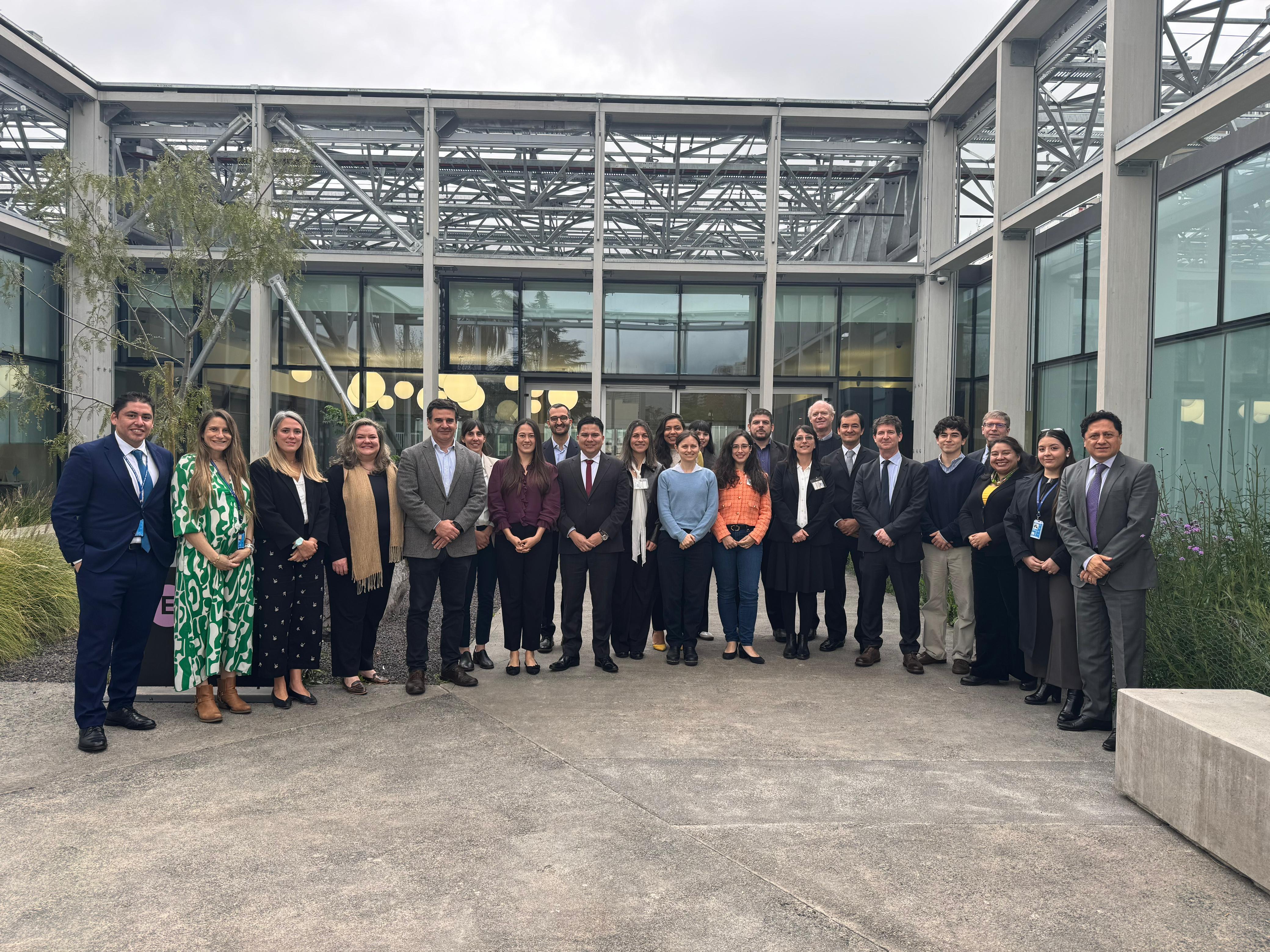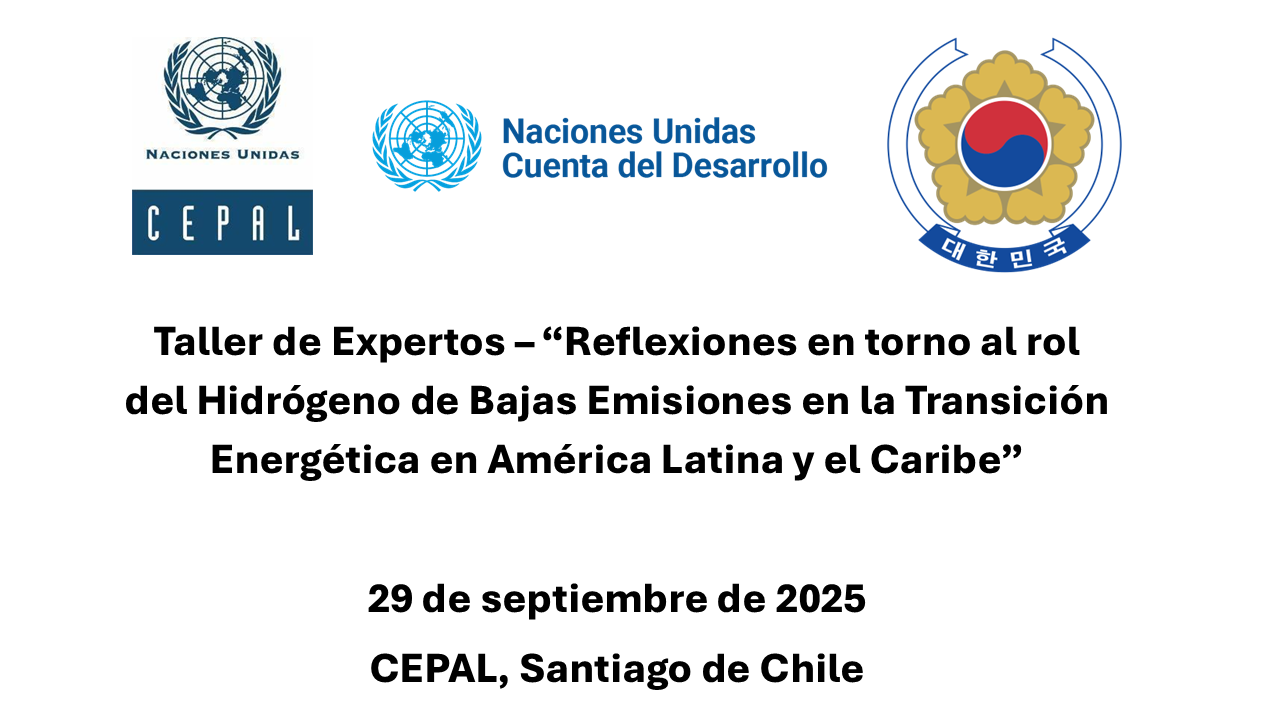Experts highlight the strategic role of low-emission hydrogen for the energy transition in Latin America and the Caribbean
Work area(s)
Topic(s)
With the participation of specialists from various countries of the region and from the international community, the Expert Workshop “Reflections on the Role of Low-Emission Hydrogen in the Energy Transition in Latin America and the Caribbean” concluded at the headquarters of the Economic Commission for Latin America and the Caribbean (ECLAC) in Santiago, Chile. The event was organized by ECLAC’s Natural Resources Division in collaboration with the Government of the Republic of Korea.

Santiago, Chile, 6 October 2025. – With the participation of specialists from various countries of the region and from the international community, the Expert Workshop “Reflections on the Role of Low-Emission Hydrogen in the Energy Transition in Latin America and the Caribbean” concluded at the headquarters of the Economic Commission for Latin America and the Caribbean (ECLAC) in Santiago, Chile. The event was organized by ECLAC’s Natural Resources Division in collaboration with the Government of the Republic of Korea.
The meeting reaffirmed that Latin America and the Caribbean (LAC) possess significant comparative advantages to position itself as a key actor in the global hydrogen economy. The region has a highly renewable power matrix, competitive clean generation costs, and abundant natural resources, complemented by growing industrial capabilities, energy infrastructure, and evolving governance frameworks. These elements constitute strategic assets to drive the development of low-emission hydrogen as a fundamental component of the region’s energy transition and productive transformation.
Participants agreed that this energy vector will be crucial for advancing the decarbonization of hard-to-abate sectors—such as heavy transport, aviation, mining, steel production, and fertilizer manufacturing—while also enabling the creation of new industrial and technological value chains that contribute to sustainable development, the generation of green jobs, and greater energy sovereignty.
Among the main messages of the workshop, participants emphasized the need for clear and stable regulatory frameworks that provide long-term investment certainty and transcend political cycles; the strengthening of public–private coordination and intersectoral articulation; and the importance of territorial planning, green financing instruments, and enhanced international cooperation. The discussions also underlined the urgency of strengthening national institutional capacities and tailoring national strategies to each country’s geographic, technological, and institutional context, avoiding one-size-fits-all approaches.
A central focus of the workshop was the analysis of international experiences, with special attention to the case of the Republic of Korea, presented as a successful example of state-led planning, infrastructure development, public–private collaboration, and market creation through industrial policy instruments. Experts underscored that the lessons derived from the Korean experience are highly valuable for Latin America and the Caribbean—particularly for guiding public policy design, accelerating technological deployment, promoting innovation, and attracting strategic investment. The discussions also highlighted the natural complementarity between both markets: while LAC can produce competitive green hydrogen thanks to its renewable resource endowment and cost advantages, Korea represents a high-demand market with advanced technological capacity and mature regulatory frameworks. This complementarity opens promising opportunities for joint projects, shared standards, and technology transfer.
In their final reflections, panelists agreed that the successful development of hydrogen in the region will depend on countries’ ability to align their strategies with existing structural capacities, stimulate domestic demand, integrate hydrogen into industrial policies, and strengthen international cooperation. They also valued the workshop as a strategic forum for technical and policy dialogue, and expressed their interest in holding it annually and on a larger scale, bringing together a broader range of public, private, financial, and academic stakeholders. Such continuity would deepen the exchange of experiences and accelerate the consolidation of a regional hydrogen ecosystem.
The activity was part of the component “Accelerating the Energy Transition in Latin America and the Caribbean” of the Korea–ECLAC Cooperation Programme 2024, and of the project “Just and Sustainable Energy Transition for Latin America and the Caribbean”, both aimed at strengthening the capacities of the region’s countries to advance towards a cleaner, more inclusive, and resilient development model.
Related content

Taller de Expertos - Reflexiones en torno al rol del Hidrógeno de Bajas Emisiones en la Transición Energética en América Latina y el Caribe
En este taller que forma parte de las actividades del Programa de Cooperación Corea – CEPAL 2024 implementado de manera sinérgica con el proyecto “Transición energética justa y sostenible para…
Country(ies)
-
Korea, Republic of